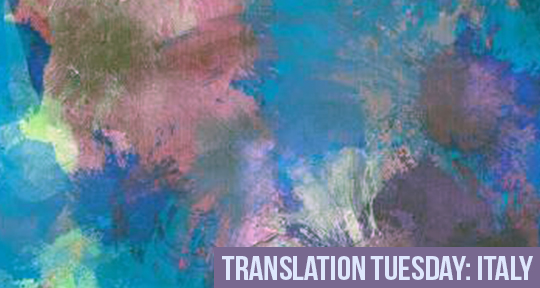Love in the time of lockdown is given voice in Beatrice Cristalli’s “What I see,” this week’s Translation Tuesday selection. Written in response to the COVID-19 crisis in Italy, the poem’s speaker prefaces the piece with a philosophical declaration about fate—through subtle and clever enjambment (the power of the poem’s one punctuated line: “Right?”), this musing becomes the speaker’s guiding question. The poem flows through possibilities and memories, to and from that one pivotal inquiry. Seemingly mundane objects—a toothbrush, a comb, a jumper—are charged with new emotive meaning as they evoke the processes brought about by the lockdown: leaving. Absence. And remembering. The speaker, trapped in the moment when these objects were fixed in place by circumstance, longs for the safety of a missing love.
What I see
They say all’s subjective
But things play parts in fate
Right?
Because I’m watching what unfolds
Outside of me, my hands
Left the toothbrush
Hairbrush comb then
Wanted to leave a jumper
But didn’t
Then recalled Samantha
How her love began
Then left all heavy things
At my place
While I slept with you
The night Winter rained
A final of its shares of time
Then I left my skin
Which wanted to die in that velvet
It’s your gaze behind my back
You see, even if I don’t see you
I know you’re breathing inside of us
Then I left all my knots
Perhaps hurling them’s possible
So I do it head-down, from the sky
Giving all to whoever can’t yet fathom
Unhappiness, sometimes mingled
Then I placed your hands into my bag
Then I almost left my own
I’d like yours in place of mine
I’d like mine this safe in yours
Translated from the Italian by Julia Anastasia Pelosi-Thorpe
Beatrice Cristalli is a poet, writer, and editor at Rizzoli Education. She deals with the organisation of school activities as part of the Premio Leopardi (CNSL), and curates research capsules at Treccani.it, encompassing sociolinguistics, literary criticism, contemporary poetry, and the Italian music industry. Cristalli is the author of the poetry collection Tre di uno (Interno Poesia, 2018), and the essay L’«invenzione» della colpa: L’antropologia leopardiana tra Zibaldone e Operette morali (Franco Cesati, 2019).
Julia Pelosi-Thorpe translates into English and into XML (TEI). Her translations of Italian and Latin poetry are published/forthcoming in the Journal of Italian Translation, the Griffith Review, the Los Angeles Review, Asymptote (Translation Tuesday column), Oberon Poetry, the Australian Multilingual Writing Project, and more. She can be found at @jpelosithorpe.
*****
Read more on the Asymptote blog:

